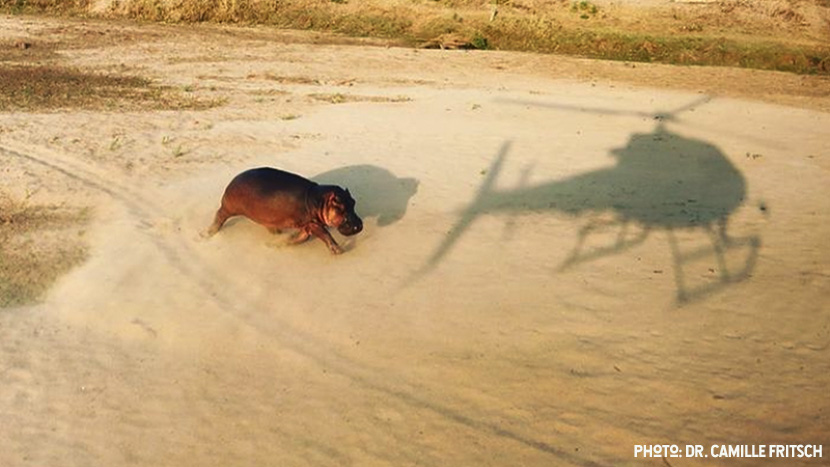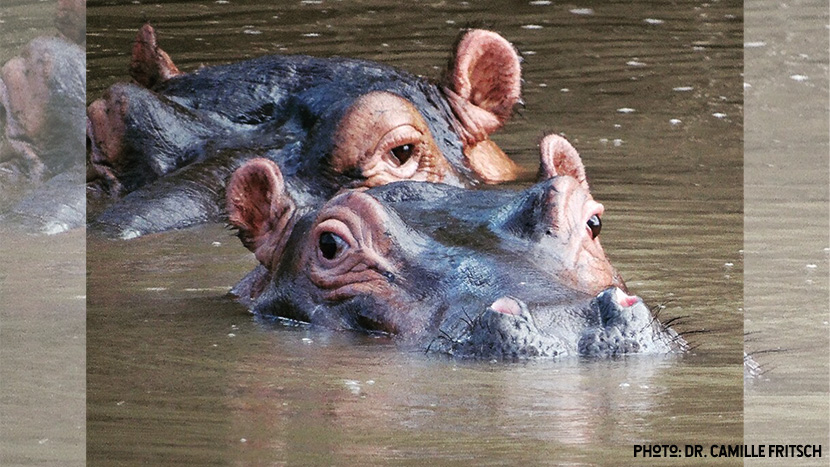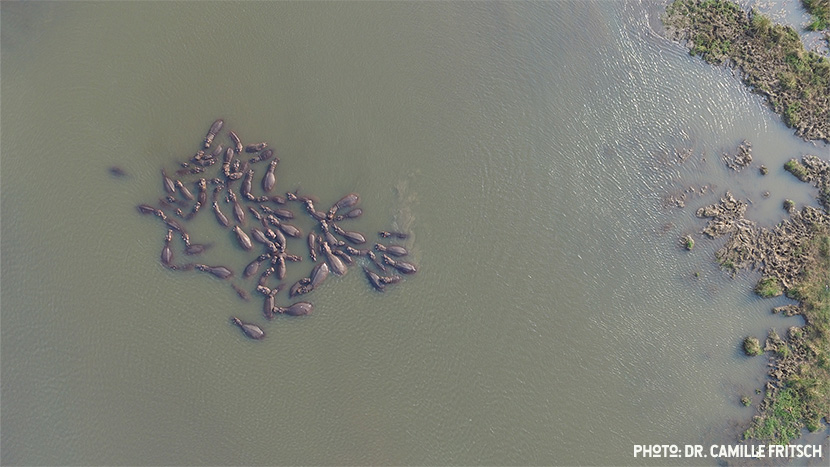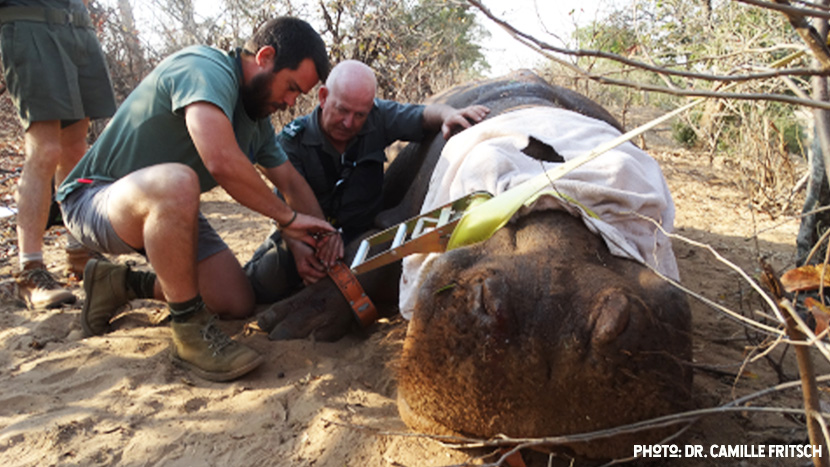Hippopotamus: Hippo Biology & More!
Hippopotamus amphibius
The chunky champion of charismatic megafauna is a famous yet understudied animal. Spending most of their days lounging in the water, and nights eating grass to fill their massive bodies, the hippopotamus is a wonder of Africa. These giants normally mind their own business, but you do not want to cross paths with either. Surprisingly fast and incredibly strong, these animals can be quite deadly if you get too close to them. It turns out the key for how to survive a hippopotamus attack is mostly to stay well out of their way, and find cover if you happen to be charged on land. We also wanted to learn more about these fascinating beasts, so we found an expert!
In this video, Kirstynn from the Untamed Science team chats with PhD and hippo expert Camille Fritsch all about hippos, how to avoid an attack, their conservation, and more!
What is a Hippo?
Dozing quietly through hot summer days in the water, and consuming mass amounts of vegetation on land at night, this seemingly “amphibious” gigantic mammal is not to be underestimated!
Hippo for short, hippopotamus belong to the Order Artiodactyla and Family Hippopotamidae. There are actually only 2 extant species of Hippos, the Common Hippopotamus (Hippopotamus amphibius) and Pygmy Hippopotamus (Choeropsis liberiensis). This page will focus on the common hippo.
The common hippo is found in pockets throughout most of Africa, except for the Northern countries where they are now extinct, such as Egypt. You will always find them near bodies of water, and they are now primarily found in protected areas, though they are not restricted to them like some other organisms, since they can travel down river ways that are impossible to fence in!
Hippos are very large mammals. Large males can get to a height od 5.2 feet, 16.5 feet long and 9,900 pounds! Their large tusks can also reach 1.5 feet!
Hippo Biology Basics
Hippos live about half of their life on land and the other half in the water. These mammals are mostly considered nocturnal, because they come out of the water to feed at night, and spend the hot days resting in the water.
They are herbivores, mainly eating grass but also being known to browse. They are also Considered “ecosystem engineers” for their massive consumption of grass and the fact that they move a lot of nutrients, mainly from the land into the water.
Believe it or not, like many herbivores, hippos can eat meat when the opportunity arises. This is especially true for easier to digest and rich-in-nutrients parts from a corpse, such as the intestine of an already dead animal. This being said, from what we understand so far, they aren’t active predators, instead just occasionally eating meat if it is convenient.
Hippos live in a group of animals called a pod (that’s right, just like whales) where a dominant male and some sub-dominant males will live with their group of females. Female hippos mature reproductively at about 3 years old. A fun fact about this is that if conditions are not favorable the year that a hippo should be ready to mate, it will delay reproductive maturity until the next breeding season! Breeding season is in the dry months and hippos will give birth just 8-10 months later! One of the fastest gestation periods of any large land mammal.
Are Hippos Dangerous?
The short answer is yes, absolutely. Though these big lumbering mammals look quite docile, and even quite cute, trust me when I say you do not want a hippopotamus for christmas! Hippopotamus are considered one of the deadliest large land animals. Though they have nothing on mosquitos for the number of people killed per year, it is somewhere near 500 deaths by hippo per year. These are large animals that are surprisingly fast and extremely strong. Also, though we don’t like to label animals as “aggressive” they can be quite territorial, and during mating season, or when protecting their calves, they definitely need their space.
How Fast Can A Hippo Swim?
You might be surprised to find out that hippopotami don’t actually swim! Instead, they walk and bounce along the bottom of the water. They can however hold their breath for around 6 minutes! With this in mind, it can be a good idea to make some noise while you are on the water so you do not accidentally startle one, causing it to attack in defense.
How Fast Can a Hippo Run?
Any hippo expert will tell you that hippos are actually extremely agile on land. Able to run at 18-25 miles/hour (30-40 kms/hr), scale up steep river banks, and swing around their large heads, hippos are to be taken quite seriously.

Avoid a Hippo Attack
Long story short, give the animals their space, and always travel with an expert! Hippos have killed people and can cause problems for locals, especially in rural areas where people need to fish alongside hippos in their habitat, but in the scheme of things, hippo attacks are usually avoidable. As Camille says in the video, giving them plenty of space is usually more than enough, and traveling with an expert guide in hippo territory can help you stay safe. If one does charge you, you probably won’t be able to outrun it, so look for cover or climb a tree, as you probably won’t be able to outrun one!
In short, the best way to survive a hippo attack is to avoid it all together by giving them plenty of space!
Hippo Conservation
Like many large land mammals, their biggest threat is loss of habitat, land use change, and because they spend so much time in the water, leaching of pesticides and excess fertilizers into water. You can help hippos by participating in Ethical and sustainable tourism in Africa
The IUCN red list considers them Vulnerable with a stable population trend, thought the story is a bit different in each area. Groups such as the IUCN SSC Hippo Specialist Group are a great source of information for what is being done to protect hippos!
What Can You Do?
Sustainable tourism and donations to organizations that protect hippo habitat can help these animals to thrive. If you are looking for a place to check out hippos and get a behind-the-scenes look at research in Africa, you can head out with Camille and their tour group Imvubu Safaris
Related Topics
The chunky champion of charismatic megafauna is a famous yet understudied animal. Spending most of their days lounging in the water, and nights eating grass to fill their massive bodies, the hippopotamus is a wonder of Africa. These giants normally mind their own business, but you do not want to cross paths with either. Surprisingly fast and incredibly strong, these animals can be quite deadly if you get too close to them. It turns out the key for how to survive a hippopotamus attack is mostly to stay well out of their way, and find cover if you happen to be charged on land. We also wanted to learn more about these fascinating beasts, so we found an expert!
In this video, Kirstynn from the Untamed Science team chats with PhD and hippo expert Camille Fritsch all about hippos, how to avoid an attack, their conservation, and more!
What is a Hippo?
Dozing quietly through hot summer days in the water, and consuming mass amounts of vegetation on land at night, this seemingly “amphibious” gigantic mammal is not to be underestimated!
Hippo for short, hippopotamus belong to the Order Artiodactyla and Family Hippopotamidae. There are actually only 2 extant species of Hippos, the Common Hippopotamus (Hippopotamus amphibius) and Pygmy Hippopotamus (Choeropsis liberiensis). This page will focus on the common hippo.
The common hippo is found in pockets throughout most of Africa, except for the Northern countries where they are now extinct, such as Egypt. You will always find them near bodies of water, and they are now primarily found in protected areas, though they are not restricted to them like some other organisms, since they can travel down river ways that are impossible to fence in!
Hippos are very large mammals. Large males can get to a height od 5.2 feet, 16.5 feet long and 9,900 pounds! Their large tusks can also reach 1.5 feet!
Hippo Biology Basics
Hippos live about half of their life on land and the other half in the water. These mammals are mostly considered nocturnal, because they come out of the water to feed at night, and spend the hot days resting in the water.
They are herbivores, mainly eating grass but also being known to browse. They are also Considered “ecosystem engineers” for their massive consumption of grass and the fact that they move a lot of nutrients, mainly from the land into the water.
Believe it or not, like many herbivores, hippos can eat meat when the opportunity arises. This is especially true for easier to digest and rich-in-nutrients parts from a corpse, such as the intestine of an already dead animal. This being said, from what we understand so far, they aren’t active predators, instead just occasionally eating meat if it is convenient.
Hippos live in a group of animals called a pod (that’s right, just like whales) where a dominant male and some sub-dominant males will live with their group of females. Female hippos mature reproductively at about 3 years old. A fun fact about this is that if conditions are not favorable the year that a hippo should be ready to mate, it will delay reproductive maturity until the next breeding season! Breeding season is in the dry months and hippos will give birth just 8-10 months later! One of the fastest gestation periods of any large land mammal.
Are Hippos Dangerous?
The short answer is yes, absolutely. Though these big lumbering mammals look quite docile, and even quite cute, trust me when I say you do not want a hippopotamus for christmas! Hippopotamus are considered one of the deadliest large land animals. Though they have nothing on mosquitos for the number of people killed per year, it is somewhere near 500 deaths by hippo per year. These are large animals that are surprisingly fast and extremely strong. Also, though we don’t like to label animals as “aggressive” they can be quite territorial, and during mating season, or when protecting their calves, they definitely need their space.
How Fast Can A Hippo Swim?
You might be surprised to find out that hippopotami don’t actually swim! Instead, they walk and bounce along the bottom of the water. They can however hold their breath for around 6 minutes! With this in mind, it can be a good idea to make some noise while you are on the water so you do not accidentally startle one, causing it to attack in defense.
How Fast Can a Hippo Run?
Any hippo expert will tell you that hippos are actually extremely agile on land. Able to run at 18-25 miles/hour (30-40 kms/hr), scale up steep river banks, and swing around their large heads, hippos are to be taken quite seriously.

Avoid a Hippo Attack
Long story short, give the animals their space, and always travel with an expert! Hippos have killed people and can cause problems for locals, especially in rural areas where people need to fish alongside hippos in their habitat, but in the scheme of things, hippo attacks are usually avoidable. As Camille says in the video, giving them plenty of space is usually more than enough, and traveling with an expert guide in hippo territory can help you stay safe. If one does charge you, you probably won’t be able to outrun it, so look for cover or climb a tree, as you probably won’t be able to outrun one!
In short, the best way to survive a hippo attack is to avoid it all together by giving them plenty of space!
Hippo Conservation
Like many large land mammals, their biggest threat is loss of habitat, land use change, and because they spend so much time in the water, leaching of pesticides and excess fertilizers into water. You can help hippos by participating in Ethical and sustainable tourism in Africa
The IUCN red list considers them Vulnerable with a stable population trend, thought the story is a bit different in each area. Groups such as the IUCN SSC Hippo Specialist Group are a great source of information for what is being done to protect hippos!
What Can You Do?
Sustainable tourism and donations to organizations that protect hippo habitat can help these animals to thrive. If you are looking for a place to check out hippos and get a behind-the-scenes look at research in Africa, you can head out with Camille and their tour group Imvubu Safaris



































































































